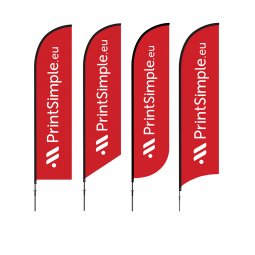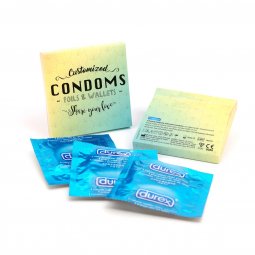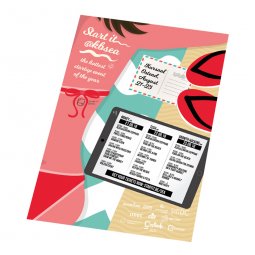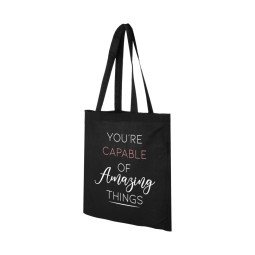Which material should I choose for my banner?
Banners exist in many different materials. Mesh and frontlit are the best known and most chosen. On this page we explain all available materials, so you can easily make the best choice for your specific situation.
Materials
The grammage of the banner is determined based on the production line on which the banners are produced. If you need a specific grammage or certification, you can always contact us for a tailor-made offer.
Mesh
 This material has a mesh-like structure. The structure makes mesh wind-permeable and therefore it's very suitable to use in places where there is a lot of wind. With this material you reduce the chance of the banners tearing or getting blown over. The mesh-like structure also has a disadvantage, the level of detail of the imprint is less good than with other materials from up close (<2 meter). At a larger distance however, you will hardly notice anything. The structure makes the banner see-through at short distance (<1 meter), so it's less suitable as visual barrier.
This material has a mesh-like structure. The structure makes mesh wind-permeable and therefore it's very suitable to use in places where there is a lot of wind. With this material you reduce the chance of the banners tearing or getting blown over. The mesh-like structure also has a disadvantage, the level of detail of the imprint is less good than with other materials from up close (<2 meter). At a larger distance however, you will hardly notice anything. The structure makes the banner see-through at short distance (<1 meter), so it's less suitable as visual barrier.
As standard, our mesh has a grammage of 270-280 g/m² and is made of PVC. If desired we can also print on mesh of 350 g/m², in which case you should request a quote. Our mesh is also FR B1 certified in terms of fire resistance.
Frontlit
 Frontlit can be used both indoors and outdoors. It has no mesh-like structure which makes the level of detail better than with mesh. This makes the banner very suitable for e.g. exhibitions. A disadvantage is that a frontlit banner catches much more wind in comparison to a mesh banner. That's why you might not want to use frontlit in places where the banner can catch a lot of wind, such as a long wall of mobile fences with frontlit screens. There is a chance that the entire wall of fences will be blown over and possibly cause damage to the banner and/or third parties.
Frontlit can be used both indoors and outdoors. It has no mesh-like structure which makes the level of detail better than with mesh. This makes the banner very suitable for e.g. exhibitions. A disadvantage is that a frontlit banner catches much more wind in comparison to a mesh banner. That's why you might not want to use frontlit in places where the banner can catch a lot of wind, such as a long wall of mobile fences with frontlit screens. There is a chance that the entire wall of fences will be blown over and possibly cause damage to the banner and/or third parties.
Our frontlit has a grammage of 510 g/m², consists of PVC and has FR B1 certification in terms of fire resistance.
Speakermesh or soundmesh
 Speakermesh or soundmesh has a mesh-like structure just like ordinary mesh, however the openings are larger so that sound passes through better. On the other hand, the level of detail of the print is slightly lower, but since it's usually viewed from a distance it still seems very good. This material is very suitable for events and festivals, for example to cover the speakers.
Speakermesh or soundmesh has a mesh-like structure just like ordinary mesh, however the openings are larger so that sound passes through better. On the other hand, the level of detail of the print is slightly lower, but since it's usually viewed from a distance it still seems very good. This material is very suitable for events and festivals, for example to cover the speakers.
Our speakermesh has a grammage of 250 g/m², consists of pvc and has FR B1 certification in terms of fire resistance.
ProPES
ProPES is a special material and unique on the market. It looks like a mix of mesh, frontlit and flag material. The print has an even higher level of detail than frontlit. Furthermore, the material is virtually completely wrinkle free and does not crease when folded. There are two types of ProPES: ProPES Outdoor and ProPES FR.
ProPES Outdoor
 Unlike other materials, ProPES is made of 225 g/m² polyester, instead of PVC, and is printed with water-based pigment inks. It is not necessary to seam the edges of the banner since it does not fray. The eyelets are made of recycled plastic instead of metal. All this makes this material very environmentally friendly and is therefore suitable if you want to keep your ecological footprint as small as possible. ProPes is weatherproof and can therefore be used outdoors.
Unlike other materials, ProPES is made of 225 g/m² polyester, instead of PVC, and is printed with water-based pigment inks. It is not necessary to seam the edges of the banner since it does not fray. The eyelets are made of recycled plastic instead of metal. All this makes this material very environmentally friendly and is therefore suitable if you want to keep your ecological footprint as small as possible. ProPes is weatherproof and can therefore be used outdoors.
However, there are two drawbacks. ProPes is not FR B1 certified and the shortest side of the banner cannot be larger than 300 cm. In other words, a banner of 300 x 500 cm is possible, but 301 x 301 cm is not.
ProPES FR
 ProPES FR is also made from 225 g/m² and is printed with eco-friendly inks. The material is fire retardant and therefore suitable for public areas. ProPES FR and ProPES Outdoor are very similar, but the fire certification is one of the distinguishing features of this material. ProPES FR can be used both indoors and outdoors. Apply it outdoors in short-term applications of up to three months.
ProPES FR is also made from 225 g/m² and is printed with eco-friendly inks. The material is fire retardant and therefore suitable for public areas. ProPES FR and ProPES Outdoor are very similar, but the fire certification is one of the distinguishing features of this material. ProPES FR can be used both indoors and outdoors. Apply it outdoors in short-term applications of up to three months.
Backlit
 Backlit is a lot like frontlit. The difference is that the backlit fabric lets more light through and the primary light source is behind the banner. This is very useful if you, due to lack of space, aesthetics or safety reasons, want to hide light sources such as spotlights behind the banner.
Backlit is a lot like frontlit. The difference is that the backlit fabric lets more light through and the primary light source is behind the banner. This is very useful if you, due to lack of space, aesthetics or safety reasons, want to hide light sources such as spotlights behind the banner.
The backlit consists of 500 g/m² PVC material and is has no FR B1 certification.
Blockout

 Blockout is the heaviest and strongest material in our range. The main feature of blockout is that a black layer has been added to the material, so it doesn't let light through. This is very useful when the banner is hanging in front of a window or if there are many different light sources that you can't control (e.g. at fairs and expo's). Objects that are behind the banner will not shine through, even if a strong light source shines on the back of the material. There are two versions; one that can be printed on one side and one that can be printed on both sides.
Blockout is the heaviest and strongest material in our range. The main feature of blockout is that a black layer has been added to the material, so it doesn't let light through. This is very useful when the banner is hanging in front of a window or if there are many different light sources that you can't control (e.g. at fairs and expo's). Objects that are behind the banner will not shine through, even if a strong light source shines on the back of the material. There are two versions; one that can be printed on one side and one that can be printed on both sides.
Single-sided blockout (4/0)
Single-sided blockout consists of 610-670 g/m² PVC and has minimum a B2 and maximum a B1 certification.
Double-sided blockout (4/4)
Double-sided blockout consists of 610 g/m² PVC that is B1 certified or 650 g/m² PVC with a B2 certification. This is the only material for banners that can be printed on both sides.
Eco Decor
 Eco Decor is a PVC-free rPET material, the polyester fabric is made from recycled PET bottles. That makes this material very ecological.
Eco Decor is a PVC-free rPET material, the polyester fabric is made from recycled PET bottles. That makes this material very ecological.
Eco Decor consists of 205 g/m² rPET, has an FR B1 certificate and is printed with water-based inks.
Textile mesh
 Textile mesh is and can be used as a PVC-free alternative to standard mesh cloth.
Textile mesh is and can be used as a PVC-free alternative to standard mesh cloth.
Textile mesh consists of 220 g/m² polyester, has an FR B1 certificate and is printed with water-based inks.
Polymesh
 Polymesh can be seen as an ecological variant of a standard mesh banner. The structure resembles PVC mesh cloths, but is made of polyester.
Polymesh can be seen as an ecological variant of a standard mesh banner. The structure resembles PVC mesh cloths, but is made of polyester.
Polymesh consists of 180 g/m² polyester, has an FR B1 certificate and is printed with water-based inks.
Kavalan
 Kavalan is a PVC-free, polyester equivalent of normal frontlit material. It is printed with water-based inks. A 3 cm reinforcement is applied to the back of this material, the stitching of which is visible on the front.
Kavalan is a PVC-free, polyester equivalent of normal frontlit material. It is printed with water-based inks. A 3 cm reinforcement is applied to the back of this material, the stitching of which is visible on the front.
Kavalan consists of 360 g/m² polyester, has an FR B1 certificate and is printed with water-based inks.
Overview
In table 1 we list the advantages and disadvantages of each material for you to compare. If you are still not entirely sure which material is the best suitable for your situation, do not hesitate to contact us. We will figure out the best solution together.
| Mesh | Frontlit | Speakermesh | ProPES Outdoor | ProPES FR | Backlit | Blockout (4/0) | Blockout (4/4) | Eco Decor | Textile mesh | Polymesh | Kavalan | |
|---|---|---|---|---|---|---|---|---|---|---|---|---|
| Wind-permeable | ||||||||||||
| Water resistant | ||||||||||||
| Level of detail print | Good | Very good | Average | Excellent | Excellent | Very good | Very good | Very good | Very good | Good | Good | Very good |
| Material | PVC | PVC | PVC | Polyester | Polyester | PVC | PVC | PVC | rPET | Polyester | Polyester | Polyester |
| g/m² | 270-280 | 510 | 250 | 225 | 225 | 500 | 610-670 | 610-650 | 205 | 220 | 180 | 360 |
| Double-sided printable | ||||||||||||
| Certificates | FR B1 | FR B1 | FR B1 | / | FR B | / | Min. B2 Max. B1 |
B1 or B2 | FR B1 | FR B1 | FR B1 | FR B1 |
| No additional light source required | ||||||||||||
| Ecological material |



